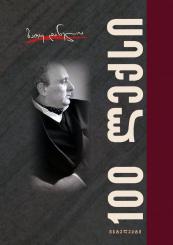‘There are contemporary poets who have new colours, style, vocabulary… there are those of older times who have stuck with aesthetics, who never stop having their readers… and there are poets who are bridges, who have taken it upon themselves to create crossings from the old to the new, and from the new to the old, and spend all their time marking out these paths. Batu Danelia is one of the ‘bridge poets’. A bridge poet cannot help having the attention from literature-lovers of both retrograde and modern world outlooks. One category reproaches him for ignoring traditions, the other category for sticking to the old ways, both categories accept and at the same time reject him as one of their own. His language is simultaneously acceptable and unacceptable, as a compound of the everyday and the literary, as a sort of anachronistic oxymoron. Being nowhere and at the same time everywhere seems to be the unintentional burden of such poets. In the final analysis, however, they create harmony and fill the cracks which have arisen between different epochs in poetry, in aesthetics, in viewpoints. It could be said that Batu Daniela’s poetry has unwittingly taken on the function of complementing contemporary Georgian poetry, of enriching the spectrum of colours and of balancing out its values. His poems are a short history of themes and forms, of artistic devices and genres. But almost everywhere we see the author’s eccentric nature, we see his humour, his peculiar approach to putting questions, which finally, when the desire arises to escape from a problem, usually become a sort of defensive weapon. For this poet everything that strikes his eye is important. He doesn’t choose the subjects of his attention, whether the theme of the poem or a character. Nor does he choose the environment. He is at the same time a village poet and a city poet. One gets the impression that someone of a hermetic psychology has made a decision to concentrate totally on the theme he is investigating and solving it spontaneously, sometimes with an overt naivety that is almost childlike. He depicts this primitive emotion with natural instruments.
‘He is a kind of grand master both in conventional poems and in blank verse. It is worth noting that he has devised his own convention poetic form and has written whole cycles in it. He himself has called such poems ‘sack cloth’. The ‘sack cloth’ has two seven-line stanzas, each line of thirteen syllables, and in each one the rhyme follows the scheme aaabbab. This collection contains 21 of his ‘sack cloths.’
Shota Iatashvili, poet, critic
‘His poems are free of any inner narcissism and depict simply and calmly the author’s life. This is presumably a sort of poetic ethics, his set of values as a writer. He hasn’t understood anything in life and depicts it naively. And this is his own depiction, turned into verse form, as a convention, which helps the author to perceive things.’
Lela Kodalashvili, writer, critic
EXTRACT
Translated into English by Donald Rayfield
IF EVERYTHING WERE TO COME BACK
If everything used up and everything spent
Were one day to come back,
Where could one put it?!
Where would you put the flowers
Taken to the graveside of the dead,
Or sent to your beloved,
And the letters, even if still unanswered,
Or the blood shed by bullets and swords:
Where could you put them,
If one day they were all to come back?!
Where can you put the strength you drained from horses,
The bellowing that came from the ox in the slaughterhouse,
The yells that we heard all last night,
The slanders we spread about the innocent,
Where could you put them
If one day they were all to come back?!
Where could you put the wasted passion,
The snakes whose heads you crushed underfoot,
The fruits of enmity and of treachery,
The sins that involved the shedding of blood –
Where could you put them?
If one day they were all to come back?!
But why the ‘If…’? –
After all, we shall arise and come back!
So they too will arise in order to come back!
And, one day, when everything comes back,
Without taking revenge on us,
Where and how can you fit them in here?! –
They will abolish us, expend us, and vaporise us.
In case of using the information, please, indicate the source.
